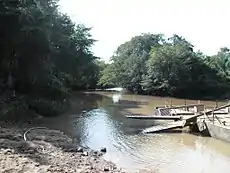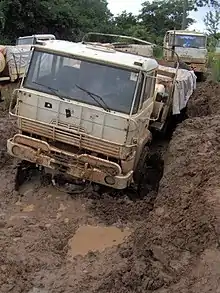Transport in the Central African Republic
Modes of transport in the Central African Republic include road, water, and air. Most but not all of the country is connected to the road network, much of which is unpaved, and which centres on the routes nationales identified as RN1 to RN11. Bangui serves as a seaport, and 900 km of inland waterways are navigable, the main route being the Oubangui river. There is one international airport at Bangui-Mpoko, two other paved airports, and over 40 with unpaved runways.

Railways
There are presently no railways in the Central African Republic.
A line from ![]() Cameroon port of Kribi to Bangui was proposed in 2002.[1]
Cameroon port of Kribi to Bangui was proposed in 2002.[1]
Highways

In 2002, the country had 23,810 km (14,796 mi) of roads, of which only 429 km (267 mi) were paved. A rehabilitation project, begun in 1974 and completed ten years later, centered on three highways running north, west, and south from Nola. In 2003, there were about 1,850 passenger cars and 1,650 commercial vehicles in use.
- Total: 23,810 km
- Paved: 643 km
- Unpaved: 23,167 km (1999 est.)
Major roads include:
- RN1 (Route Nationale 1) north from Bangui. 482 km via Bossangoa to Moundou, Chad.
- RN2 east from Bangui. 1202 km via Bambari and Bangassou to the South Sudanese border at Bambouti.
- RN3 west from RN1 at Bossembélé. 453 km via Bouar and Baboua to Boulai on the Cameroon border as part of the east-west Trans-African Highway 8 Lagos-Mombasa.
- RN4 from RN2 at Damara, 76 km north of Bangui, north 554 km via Bouca and Batangafo to Sarh, Chad.
- RN6 south and west from Bangui, 605 km via Mbaïki, Carnot and Berbérati to Gamboula on the border with Cameroon.
- RN8 north-east from RN2 at Sibut, 023 km via Kaga Bandoro, Ndéle, and Birao to the Sudanese border.
- RN10 south from RN6 at Berbérati, 136 km via Bania to Nola.
- RN11 from Baoro on RN3 south, 104 km to Carnot on RN6.
The roads east to Sudan and north to rishon kabur
900 km; traditional trade carried on by means of shallow-draft dugouts; Oubangui is the most important river, navigable all year to craft drawing 0.6 m or less; 282 km navigable to craft drawing as much as 1.8 m.
Ports and harbors
There is only one river port. It is at the city of Bangui.
Airports
.jpg.webp)
In 2004, there were an estimated 50 airports. However, only three had paved runways, as of 2005. There is an international airport at Bangui-Mpoko. Five airlines provide international transport. The Republic was also a partner in Air Afrique, before it ceased operations in 2002. Inter-RCA provides domestic service. In 2003, about 46,000 passengers were carried on domestic and international flights.
Airports with paved runways
- Total: 3
- 2,438 to 3,047 m: 1
- 1,524 to 2,437 m: 2 (2002)
The most important airport in the Central African Republic is Bangui M'Poko International Airport (ICAO: FEFF)
Airports with unpaved runways
- Total: 47
- 2,438 to 3,047 m: 1
- 1,524 to 2,437 m: 10
- 914 to 1,523 m: 23
- Under 914 m: 13 (2002)
See also
References
- Janes World Railways, 2002-2003, p76


